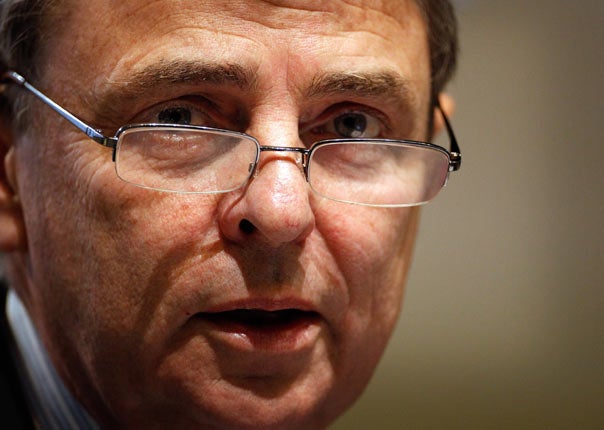Strike talks 'in jeopardy' over pension reforms

Your support helps us to tell the story
From reproductive rights to climate change to Big Tech, The Independent is on the ground when the story is developing. Whether it's investigating the financials of Elon Musk's pro-Trump PAC or producing our latest documentary, 'The A Word', which shines a light on the American women fighting for reproductive rights, we know how important it is to parse out the facts from the messaging.
At such a critical moment in US history, we need reporters on the ground. Your donation allows us to keep sending journalists to speak to both sides of the story.
The Independent is trusted by Americans across the entire political spectrum. And unlike many other quality news outlets, we choose not to lock Americans out of our reporting and analysis with paywalls. We believe quality journalism should be available to everyone, paid for by those who can afford it.
Your support makes all the difference.Firefighters are set to be balloted for strikes after public sector union leaders rounded on the Government for "crudely" releasing details of its controversial pension reforms mid-way through crucial talks.
Leaders of teachers, nurses, civil servants, firefighters and other public sector workers attacked ministers after they published their proposals to increase employee contributions.
Under the changes, nurses and classroom teachers earning £25,700 will pay an extra £10 a month for their pension in 2012/13, an NHS consultant on £130,000 will pay an extra £152 a month, while civil servants will see their contributions rise by between £20 and £140 a month.
Chief Secretary to the Treasury Danny Alexander said the Government wanted to set a "fairer balance" between what workers and the taxpayer contributed towards public sector pensions, pledging that the lowest paid will be protected and the highest earners will face the biggest increases.
Around 750,000 workers should pay nothing extra and another one million should pay no more than 1.5% extra, although the proposals announced today would deliver around £1 billion of savings, said the Government.
Union leaders said workers had been "frightened" by the announcement, which Unison's Dave Prentis warned had jeopardised the ongoing negotiations.
"We entered into the scheme specific talks on public sector pensions in good faith and we genuinely believe we are making progress, albeit slowly.
"But these talks are being put in jeopardy by the crude and naive tactics of Government ministers who don't seem to understand the word negotiate.
"The Government must take its responsibilities seriously, and stop treating these talks like some kind of playground game," he said.
The Fire Brigades Union said it was making preliminary arrangements for a strike ballot, warning that industrial action looked "increasingly likely" in the autumn.
The union said it was opposed to proposals to increase contributions to the main firefighter pension scheme from 11% to 14%, and to 17% for fire officers, and to increase the pension age to 60.
General secretary Matt Wrack said: "This pensions robbery is a crude smash and grab raid on firefighter pension rights to help pay for the budget deficit. It is nothing to do with long-term sustainability or affordability.
"These proposals have been drafted by people who are completely ignorant of the real work firefighters are required to do. It is daft to expect people of 60 and beyond to work as an operational firefighter. Even the very fittest will struggle to do that."
Unite was angered by the continued description of public sector pensions as "gold-plated", pointing out that the average local government pension was just £4,000 a year and over half of female NHS employees can expect an average of £3,500 a year.
Brian Strutton, national officer of the GMB, said: "The assault on public sector workers' pay over the last few years has led to deep cuts in living standards and is getting close to busting point. These workers cannot take a pay freeze for another year, neither can they afford cuts in pay to meet higher pensions contributions to ease Treasury finances."
Mark Serwotka, general secretary of the Public and Commercial Services union, said: "This announcement shows the need for trade unions to stay united and build for more industrial action."
Christine Blower, general secretary of the National Union of Teachers, warned that further action could not be ruled out.
"Beginning a formal consultation over the political recess when there will be little chance for scrutiny will be regarded quite rightly by teachers as a cynical move."
The Treasury said that protections for the lowest paid mean that those earning less than £15,000 will see no increase and those earning between £15,000 and £21,000 will have their increase capped to 0.6% in 2012/13. The maximum increase in 2012/13 will be 2.4%.
Talks on specific schemes such as those in local government and the NHS will lead to proposals by the end of October on how savings of £2.3 billion in 2013/14 and £2.8 billion in 2014/15 are achieved, with a meeting set to be held next week.
Cabinet Office minister Francis Maude said: "The unions have absolutely known that this process was going on. The idea that anyone is taken by surprise by this is nonsense."
He said strikes would be "very disappointing" because the Government was committed to ensuring that public sector pensions were "among the very best available", adding: "There's still a lot to talk about for the future long-term design of the scheme but there will continue to be, unlike most pension schemes, defined benefit with a guaranteed pension level so no investment risk and they'll be good pensions."
PA
Join our commenting forum
Join thought-provoking conversations, follow other Independent readers and see their replies
19Comments